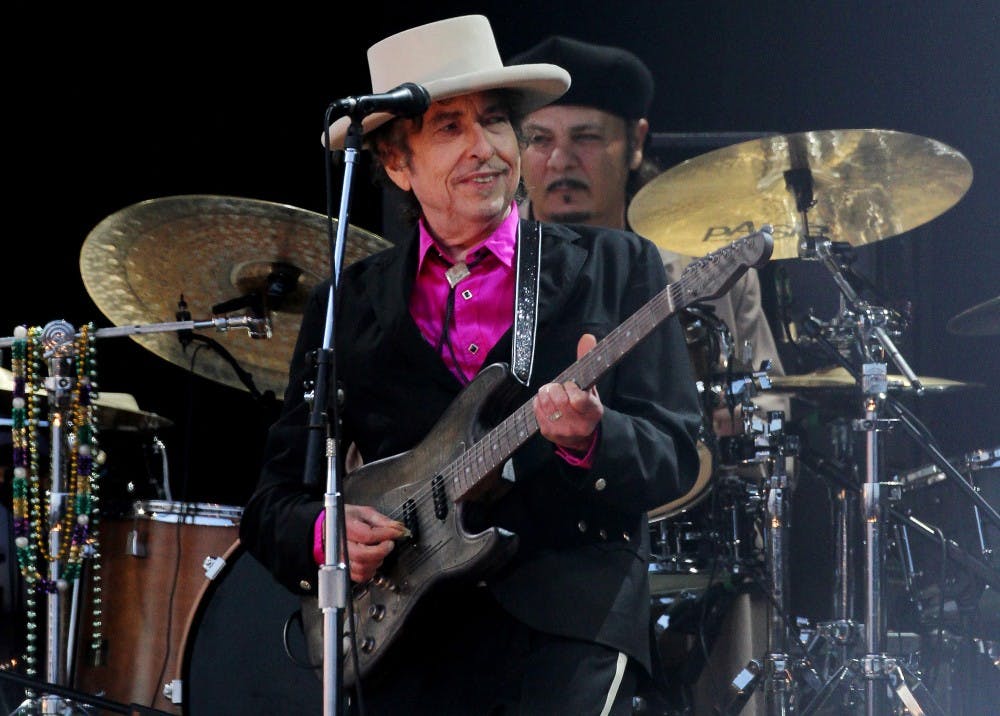Bob Dylan — the 2016 winner of the Nobel Prize for Literature — is not the typical recipient for this high-profile literary award.
The announcement of Dylan’s award on Thursday was accompanied by an outpouring of differing opinions from journalists and the arts world. Many criticized the seeming discrepancy of giving Dylan a literary award, believing that the musician, while talented, should not be considered a literary genius or poet and instead simply a songwriter.
However, while Dylan might not be a conventional recipient for this award, I believe that it is well deserved by the folk-rock legend and that today’s political and social climate more than ever suggest that Dylan is a fitting awardee.
Dylan’s music was the heartbeat of an era. His lyrics captured the particularly turbulent feeling of the 1960s and helped breathe life into social movements that were burgeoning at the time, specifically the civil rights and anti-war movements.
When Dylan sang, he expressed his observations of the chaos and shifting sentiment occurring around him, When those also living through Dylan’s time heard his poetic versions of what was surrounding them politically and socially, they identified with his music strongly, which kickstarted his growing popularity.
The early popularity of Dylan wasn’t because of vocal talent or catchy tunes. While his songs possess both, they often require a certain acquired taste to fully appreciate his sound.
Dylan became a legend because of his lyrics.
The artist took common feelings and everyday emotions and spun them into words both poetic and relatable. Songs like “Blowin’ in the Wind” and “It Ain’t Me, Babe” captured a national feeling and bottled it in song for the typical man and woman — and more accurately than any literary leftover novels from the 1950s or written political treatises of a changing world could.
In a sense, Dylan’s songs were the literature of the 1960s, forming a canon all their own. Everyone could listen to Dylan or sing along, and everyone could relate. His work brought folk music down from a lofty and niche-group position and spread it out over the different classes, races and genders, unifying America and leaving a record of the country during the '60s for all of us today to examine and hear.
Why is Dylan a particularly fitting recipient for this award in this particular year, 2016?
He is so relevant because of the current ever-changing state of the world and the similarities we find when we compare now to Dylan’s prime, and because of today’s need for a unifying voice — a voice that can translate our feelings into lyric with such an amount of understanding that the words almost sound familiar.
Dylan’s heyday saw the advent of the Cold War, the rise of Second-Wave Feminism, the speeches of Martin Luther King Jr. and Malcolm X, the bloodshed of the Vietnam War and the domestic turmoil that was a response to this war in the U.S.
Comparatively, we that are living in the America of 2016 are constantly connected to media platforms that expose us to those in other nations — both our wounded and those who we wound — speeches that combat still-rampant sexism, racism and homophobia; a toxic presidential election; the all-too-frequent instances of violence and sexual assault and the lack of accountability that accompanies these instances — sounds very similar to the 1960s, right?
Dylan did not receive this year’s Nobel Prize for Literature for his masterful novels or groundbreaking poetry collection.
Rather, he was given the award because of the words that he gave the American people years ago — words that lacked pretension and that encouraged unity, words that uplifted and yet dealt with reality, words that characterized a shifting nation and all of her people.
We are living today in times that are “a-changin,” in very similar ways to those of Dylan’s era and we can only hope that this generation will birth a creative voice that can compare to that of this celebrated folk singer.
In the meantime, I suggest we keep listening.
Give “The Freewheelin’ Bob Dylan” another spin, press play on “Blonde on Blonde,” and allow “The Basement Tapes” to say what you feel about all of the crazy things happening in the world. Let Dylan’s lyrics smooth together this national time of crisis and capture the national mood as accurately today as they did half a century ago.

